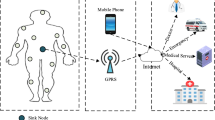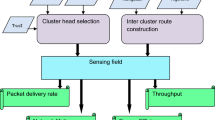Abstract
Energy is the important criterion for a decentralized network. By the cooperative physical layer network coding scheme, the requirement of energy transmission can be reduced. This could be implemented using two routing algorithms namely CCSPR and COSPNCR. An algorithm is constructed for reducing power consumption and rate control. In contradiction of the conventional power aware algorithms, an efficient power aware routing (EPAR) method is proposed which distinguishes the capability of nodes by its residual battery power, and through the expected energy that spent in reliably data packets forwarding on a specific link. To evaluate this, the data routing is performed with high mobility in dynamic environment. By using this algorithm, less cost path can be chosen and data rate can also be controlled. Thus energy consumption can be decreased and hence lifetime of a node can be improved. This approach first identifies the path having high lifetime and through that path, the communication will take place. This work consumes a lesser amount of energy for the routing, thus makes power efficient routing. Hence the throughput is increased and the power consumption is reduced. The conventional shortest path routing method on regular line and the grid line networks attains the gain of energy savings up to 45–75% correspondingly. By using EPAR algorithm, the energy consumption rate is minimized, so the network life time and the performance are improved. The energy consumption rate can be decreased to 80% by using EPAR approach in Mobile Ad hoc Networks.









Similar content being viewed by others
References
Le, T. A., & Nakhai, M. R. (2010). Possible power-saving gains by dividing a cell into tiers of smaller cells. Electronics Letters, 46(16), 1163–1165.
Su, W., Lee, S., Pados, D. A., & Matyjas, J. D. (2011). Optimal power assignment for minimizing the average total transmission power in hybrid-ARQ Rayleigh fading links. IEEE Transactions on Communications, 59(7), 1867–1877.
Kaur, A., Kaur, J., & Kansal, N. (2016). D-EPAR: Distance-efficient power aware routing protocol for MANETs. In 2016 2nd international conference on next generation computing technologies (NGCT) (pp. 401–408). IEEE.
Anand, M., & Sasikala, T. (2018). Efficient energy optimization in mobile ad hoc network (MANET) using better-quality AODV protocol. Cluster Computing. https://doi.org/10.1007/s10586-018-1721-2.
Pawan, Sharma, R. K., Sharma, A. K., & Jain, V. (2018). Genetic algorithm-based routing protocol for energy efficient routing in MANETs. In Next-generation networks. Advances in intelligent systems and computing (Vol. 638). Singapore: Springer.
Yang, S., & Wu, J. (2010). Efficient broadcasting using network coding and directional antennas in MANETs. IEEE Transactions on Parallel and Distributed Systems, 21(2), 148–161.
Madan, R., Mehta, N. B., Molisch, A. F., & Zhang, J. (2008). Energy-efficient cooperative relaying over fading channels with simple relay selection. IEEE Transactions on Wireless Communications, 7(8), 3013–3025.
Sanchez, S. M., Souza, R. D., Fernandez, E. M., & Reguera, V. A. (2013). Rate and energy efficient power control in a cognitive radio adhoc network. IEEE Signal Processing Letters, 20(5), 451–454.
Min, Z., Qimei, C., Riku, J., & Xiaofeng, T. (2012). Energy efficient relay selection and power allocation for two-way relay channel with analog network coding. IEEE Communication Letters, 16(6), 816–819.
Ibrahim, A., Han, Z., & Liu, K. (2010). Distributed energy-efficient cooperative routing in wireless networks. IEEE Transactions on Wireless Communications, 7(10), 3930–3941.
Das, S. K., & Tripathi, S. (2016). Intelligent energy-aware efficient routing for MANET. Wireless Networks, 24(4), 1139–1159.
Akhtar, A. M., Nakhai, M. R., & Aghvami, A. H. (2013). On the use of cooperative physical layer network coding for energy efficient routing. IEEE Transactions on Communications, 61(4), 1498–1509.
Li, L. E., Alimi, R., Shen, D., Viswanathan, H., & Yang, Y. R. (2010). A general algorithm for interference alignment and cancellation in wireless networks. In INFOCOM, 2010 Proceedings IEEE (pp. 1–9). IEEE.
Maham, B., Narasimhan, R., & Hjorungnes, A. (2009). Energy-efficient space-time coded cooperative routing in multihop wireless networks. In Global telecommunications conference, 2009. GLOBECOM 2009. IEEE (pp. 1–7). IEEE.
Akhtar, A. M., Nakhai, M. R., & Aghvami, A. H. (2012). Power aware cooperative routing in wireless mesh networks. IEEE Communications Letters, 16(5), 670–673.
Argyriou, A., & Pandharipande, A. (2010). Cooperative protocol for analog network coding in distributed wireless networks. IEEE Transactions on Wireless Communications, 9(10), 3112–3311.
Chen, Q., & Gursoy, M. C. (2010). Energy efficiency analysis in amplify-and-forward and decode-and-forward cooperative networks. In Wireless communications and networking conference (WCNC), 2010 IEEE (pp. 1–6). IEEE.
Vir, D., Agarwal, S. K., & Imam, S. A. (2013). Simulation of energy consumption analysis of multi-hop 802.11 wireless ad-hoc networks on reactive routing protocols. Simulation, 3(1), 1213–1218.
Akhtar, A. M., Nakhai, M. R., & Aghvami, A. H. (2011). Adaptive power-aware routing in wireless mesh networks. In 2011 IEEE 73rd vehicular technology conference (VTC Spring) (pp. 1–5). IEEE.
Saad, M. I. M., & Zukarnain, Z. A. (2009). Performance analysis of random-based mobility models in MANET routing protocol. European Journal of Scientific Research, 32(4), 444–454.
Mishra, S., Satpathy, S. M., & Mishra, A. (2011). Energy efficiency in ad hoc networks. International Journal of Ad hoc, Sensor & Ubiquitous Computing, 2(1), 139–145.
Varaprasad, G., & Narayanagowda, S. H. (2013). Implementing a new power aware routing algorithm based on existing dynamic source routing protocol for mobile ad hoc networks. IET Networks, 3(2), 137–142.
Bhople, N. B., & Waghmare, J. M. (2016). Energy routing protocol with power utilization optimization in MANET. In IEEE international conference on recent trends in electronics, information & communication technology (RTEICT) (pp. 1371–1374). IEEE.
Shankar, S., Sivakumar, B., & Varaprasad, G. (2012). Study of routing protocols for minimizing energy consumption using minimum hop strategy in MANETs. International Journal of Computing Communication and Network Research (IJCCNet Research), 1(3), 10–21.
Yu, C., Lee, B., & Yong Youn, H. (2003). Energy efficient routing protocols for mobile ad hoc networks. Wireless Communications and Mobile Computing, 3(8), 959–973.
Rishiwal, V., Verma, S., & Bajpai, S. K. (2009). QoS based power aware routing in MANETs. International Journal of Computer Theory and Engineering, 1(1), 49.
Zhu, J., & Wang, X. (2011). Model and protocol for energy-efficient routing over mobile ad hoc networks. IEEE Transactions on Mobile Computing, 10(11), 1546–1557.
Author information
Authors and Affiliations
Corresponding author
Additional information
Publisher's Note
Springer Nature remains neutral with regard to jurisdictional claims in published maps and institutional affiliations.
Rights and permissions
About this article
Cite this article
Femila, L., Marsaline Beno, M. Optimizing Transmission Power and Energy Efficient Routing Protocol in MANETs. Wireless Pers Commun 106, 1041–1056 (2019). https://doi.org/10.1007/s11277-019-06202-7
Published:
Issue Date:
DOI: https://doi.org/10.1007/s11277-019-06202-7




